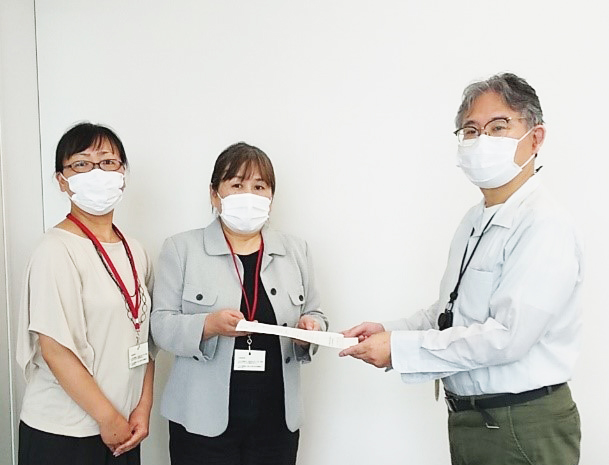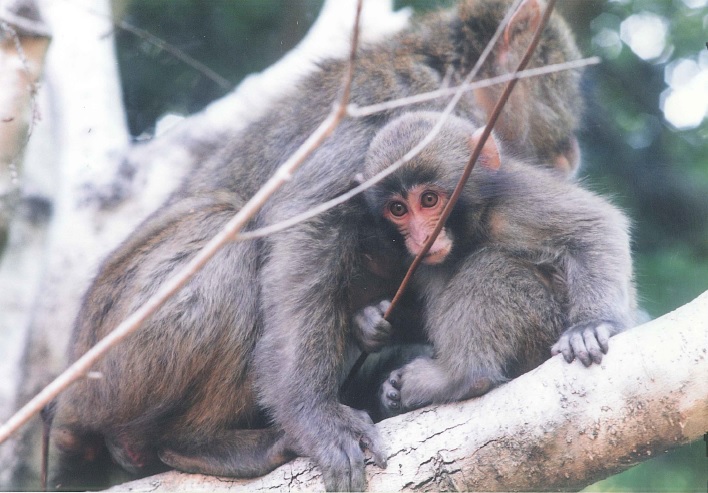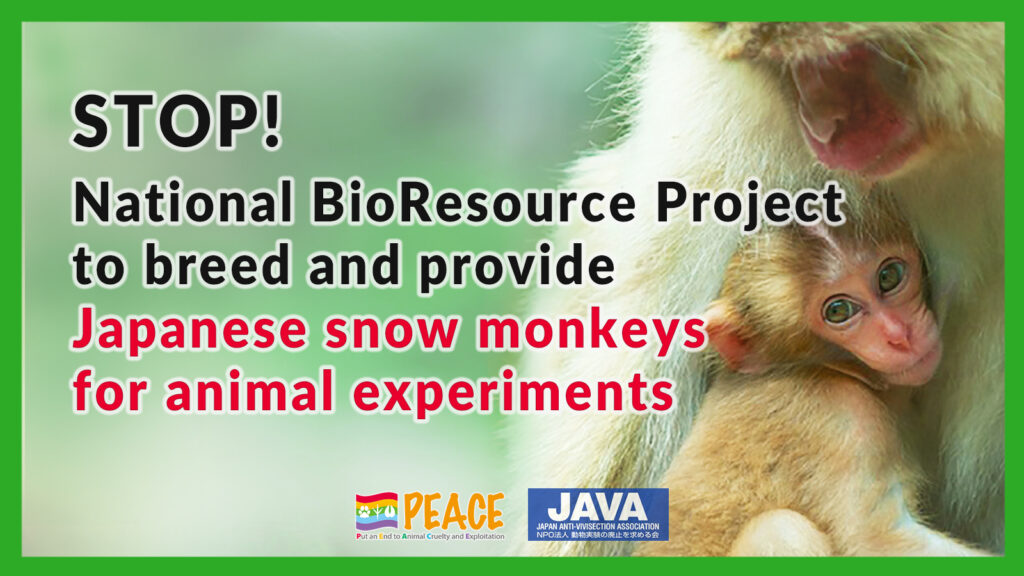We’re collecting signatures!
We do request the Minister of Education, Culture, Sports, Science and Technology to abolish the project, breeding and supplying Japanese snow monkeys for animal experiments.
The National BioResource Project “Japanese Macaques” which has continued breeding and supplying Japanese macaques for animal experiments for over 20 years.
We have started a signature campaign to request the Minister of Education, Culture, Sports, Science and Technology to end this project. We’re collecting signatures for it. Thank you for your cooperation.
What is the National BioResource Project (NBRP)?
It is a major project initiated by the Ministry of Education, Culture, Sports, Science and Technology (MEXT) in 2002 to collect and stably provide bio-resources (biological and genetic resources) such as animals, plants, microorganisms so-called experiment materials. Various species of animals such as mice, rats, birds, fish, amphibians, insects and others as well as Japanese Macaques are being handled (as of January 2023).
The project for “Japanese Macaques” which referred the primates centers in the United States set a goal to collect 1,500~2,400 macaques as a mother group and supply 300 macaques for experiments every year. And to make a mother group, overbred Japanese Macaques are collected from zoos and wild monkey parks, and total number of 982 baby monkeys were sent to the 35 universities and research institutes from 2006 to 2021.
This project is run by Center for the Evolutionary Origins of Human Behavior, Kyoto University (EHUB) as Core Center (It used to be Kyoto University Primate Research Institute (KUPRI) until 2022) and National Institute for Physiological Sciences (NIPS) as sub-Core Center.
We JAVA had been against it since they were collecting monkeys for a mother group.
For collecting monkeys for a mother group, about 20 years ago three zoos in Japan agreed with KUPRI as Core Center of the project at that time to supply monkeys, but two of them decided to cancel due to strong protests from JAVA. JAVA continued to fight against the remaining one, Sapporo Maruyama ZOO. We did as much as we could: signature activities, appeal actions in front of MEXT and Sapporo City Hall, discussions with MEXT, Maruyama ZOO and Sapporo City, a request for resident audit, and a trial. However, the Supreme Court dismissed JAVA’s appeal. And then Maruyama ZOO sent 45 monkeys to KURPI in 2005.

We have reached out to MEXT and others since 2020.
The book published in October 2020 revealed the actual situation of business reduction and surplus monkeys by the interviews with people involved in the project. This brought the issue of the project back to the fore.
For this reason, JAVA, together with the animal protection group PEACE (Put an End to Animal Cruelty and Exploitation), which is also collaborating in other activities, sent open questionnaires and requested information disclosure to MEXT, KUPRI (at that time) and NIPS in order to confirm the status of Japanese macaques and results of past projects. We have been working to stop breeding and supplying of Japanese macaques and to end the project. However, they do not disclose informations such as the source of the maternal monkeys and the providing destination of the bred monkeys.

From right side, Takashi Tuziyama (Senior Specialist for Life Sciences at MEXT (at that time)), Sachiko Azuma Chair at PEACE), Satoko Wazaki (Head of Secretariat at JAVA)
Breaking away from the experimental use of animals especially primates, which have been highly criticized.
In recent years, there has been a growing trend to avoid the use of animals in science. For example, in 2010, the EU specified that “this Directive represents an important step forward achieving the final goal of full replacement of procedures on live animals for scientific and educational purposes as soon as it is scientifically possible to do so”, in “EU directive on the protection of animals used for scientific purposes” which member states are obliged to comply with. Furthermore, on September 15th, 2021, the European Parliament adopted a resolution calling on the European Commission to establish an action plan to actively phase out the use of animal experiments.
In addition, the Netherlands has already declared that it will become global leader in innovation without relying on experimental animals by 2025.
Japanese macaques live in groups of about 10 to 100 monkeys, centered around females and children, and lead complex and highly social lives. It is well known that they are very intelligent animals with excellent memory and cognitive abilities. Japanese macaques are animals that do not have a fixed roost and live on the move. Their range of activity extends from several to several dozen square kilometers, and sometimes even up to 100 square kilometers in some cases.
There is significant international criticism of using primates, which have high cognitive abilities and social skills for animal experiments and there is no future for primates as the resource that is moving toward stricter regulations and NBRP “Japanese Macaques”. Japan should also aim to abolish the experiment using animals, including the primates.
The future of the Japanese macaques raised in Amami Wild Animal Research Center.
Furthermore, regarding the project, there is an issue of what to do with the monkeys of Amami Wild Animal Research Center, which is subcontractor for the project by the NIPS. The center has been raising 163 Japanese macaques as of March 31th, 2022, but they are no longer breeding.
The researchers who use monkeys in experiments and the businesses which profit from the results of the experiments, they would have a responsibility to provide the monkeys with natural and animal welfare circumstances to spend the rest of their lives calm.
In 2019, MEXT finally acknowledged that the subcontracted private institution was Amami Wild Animal Research Center in response to questions from the Diet. We have a strong distrust of the project and MEXT, which have stubbornly refused to disclose to us which private institutions receive huge budgets each year without competitive bidding, and how much the comission fees have been paid each year.
Regarding to the treatment of the monkeys raised in Amami Wild Animal Research Center, we sent a total of three questionnaires to both Core Center and Sub-Core Center, but they replied that they were still considering it. We have already requested the both to announce details as soon as the policy has been determined. But when we met with the representative of MEXT in September 2021, just they said, “Killing the monkeys has not even been considered.” No further information was provided.
They ignored the request and started the 5th period.
We are not against NBRP its own. We just want to abolish animal experiments and tackle developing alternative methods with sufficient budget instead of animal victims. We suggest using human cells or tissues as resources that are necessary to the alternative methods. However, MEXT didn’t accept our request and decided to continue NBRP “Japanese Macaques” for the 5th period (from April 2022 to March 2027). Moreover, the amount of subsidies to be issued to Core Center and Sub-Core Center were the same, and it was found that there was no intention of downsizing the project.
Started a signature campaign to the Minister of MEXT.
Please support us!
In April 2023, JAVA and PEACE have started a signature campaign to request the Minister of MEXT to end NBRP “Japanese Macaques” by the end of 5th period (Signature campaign deadline: on March 31st, 2025).
- NBRP “Japanese Macaques” project should be terminated by the end of the 5th period.
- In the 6th period, we request that you reduce the number of projects adapted applications not only for the Japanese Macaques but also for other animal species as much as possible, and support projects that lead to the development of research methods that do not involve animal experiments.
Click this link and sign your name please.
Notification: Requests for donations displayed after signing or on the signature page are donations to Change.org, not for JAVA and PEACE. Signing is free. Your signature deserves to change the world.
https://www change.org/stop-NBRPmonkey-en.
Thank you for your cooperation.


